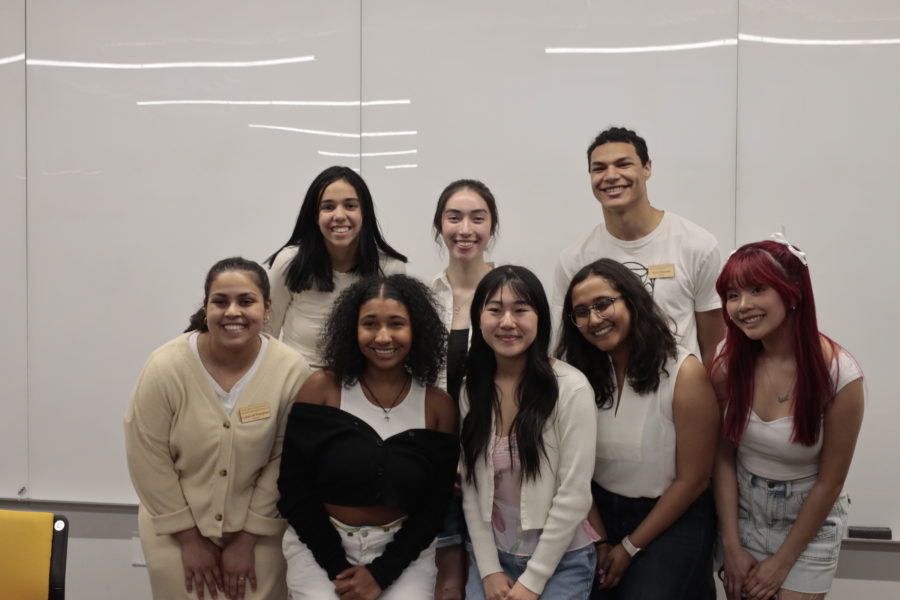International students discuss job application challenges and tuition transparency
Editor’s note: The Iowa State Daily refrains from using the names of participants in the town hall due to privacy requests from the committee.
Student Government and the International Student Council discussed the job application process and tuition transparency with members of the Iowa State community at an international student’s town hall meeting Thursday.
A real-time collaborative web platform was available for attendees to post on to message, answer or ask questions anonymously as topics were brought up throughout the town hall.
Cost of attendance for international students
One audience member said the price of tuition is not common knowledge, even among domestic students, which is a problem that needs to be addressed.
“Tuition isn’t created by the university; it’s created by the Board of Regents, which is the state of Iowa,” the audience member said. “It is up to them, who have no affiliation to Iowa State, to basically decide the tuition for both domestic and out-of-state and international students.”
The Iowa Board of Regents approved a 4.25% tuition increase on July 27, 2022 that was implemented in the 2022-23 academic year. The audience of the town hall was split on whether or not this rise in tuition is justified.
Anonymous sources on the town hall discussion platform commented that the tuition raises are “definitely not justifiable” because students are not being informed of the reasons behind the cost increase.
“People are going to other countries now; increasing cost will drive them more,” another anonymous audience member said.
A big point of discussion was whether or not Student Government and the International Student Council could create a transparency statistic that will help students understand where their tuition money is going.
Harish Radhakrishnan, a graduate student in mechanical engineering and a senator in the Graduate and Professional Student Senate, inquired about these statistics.
“The Metrics that ISSO [International Students and Scholars Office] collects, do you guys collect metrics of international students versus U.S. national students in terms of, let’s say, there is a budget cut?” Radhakrishnan asked. “How does it affect international students versus U.S. nationals when there are fee increases? What about median graduation times, job placement rates, job offers received per student, student work-life balance. Does ISU collect these kinds of metrics? If they don’t, would ISSO be willing to set up a special committee?”
What makes getting a job or career difficult in the U.S.?
One audience member said international students already need to fill out a multitude of papers, so the job application process is more difficult and often discourages students from completing job applications as often.
Many international students also do not have any professional contacts in the U.S., and employers can often be hesitant to hire international students.
“[It is] difficult when your area of interest is something which often requires being a citizen a mandatory requirement,” an anonymous audience member said.
Kathryn Wieland, the associate director for career services in the business department, said there is also a known concern that the people who sign companies up to attend the career fair are not the same people who show up to the fair. The representatives may not be as inclusive as the online sign-up may suggest, according to Wieland.
Kellie Olson, the associate director of career services, brought up a concern within CyHire regarding filter settings.
“We were advised legally to take out that option to filter down or for companies to put in if they’re interested in hiring international students because that could be something that can easily lead to discrimination, so that is no longer an option in CyHire unfortunately,” Olson said. “Most of the time, it was very inaccurate because we received it as more of a frustration point for students.”
A potential solution suggested by an audience member is to create career fairs with businesses that specifically look for and hire international students.
“There could be an event where there could be a professional meet and greet to network with professionals in their field who are or were international students,” an event representative who wished to remain anonymous said.
Do international students feel supported around campus?
Many of the students, like Valerie Ng, a junior studying psychology and criminal justice, felt they were welcomed and supported around campus when they actively sought out help or advice.
“If you want to feel supported or welcomed, you have to personally be responsible to seek out communities that actually will support you and look out for you,” said Ng, an international transfer student from Malaysia and the treasurer of the International Student Council. “In my home country, we didn’t really have that.”
Sohini Mondal, a graduate student in electrical and computer engineering, talked about ISSO adding an anonymous box for tips on how to address situations that students may be uncomfortable bringing up to a faculty member.
“I personally feel that having an anonymous thing would be helpful if we are unsure of something that we want to talk about or whom to approach,” Mondal said.
Your donation will support the student journalists of the Iowa State Daily. Your contribution will allow us to purchase equipment, send our student journalists to conferences and off-set their cost of living so they can continue to do best-in-the-nation work at the Iowa State Daily.













